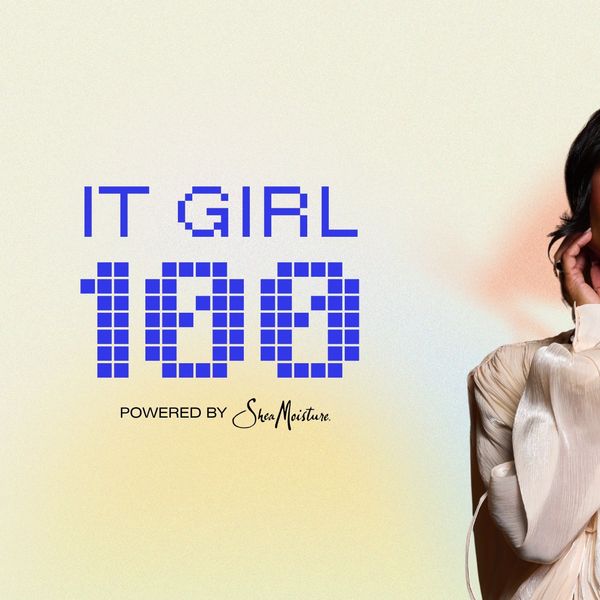The 'Fits You Missed From The 2021 BET Hip Hop Awards Red Carpet
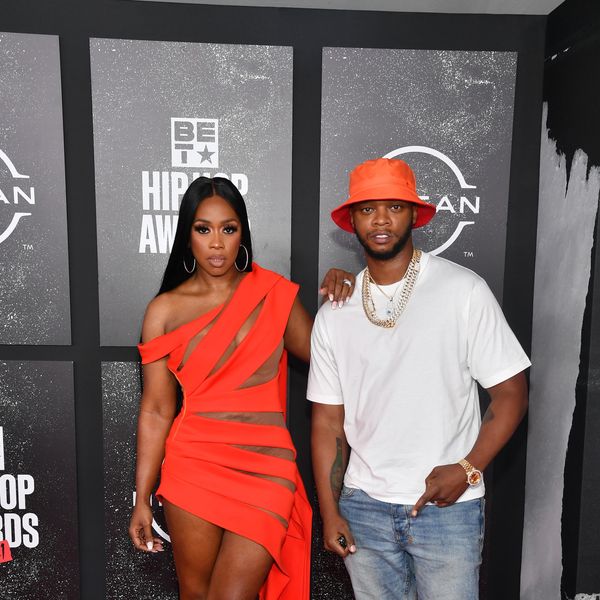
Tonight, the biggest names in hip-hop gather to kick off the 16th annual BET Hip Hop Awards in Atlanta. Held at the Cobb Energy Performing Arts Centre, this year's show is hosted by the 85 South Crew: Karlous Miller, Young Fly, and Chico Bean. Nelly will be honored with the I Am Hip Hop Award, awarded last year to Master P.
Industry powerhouses Cardi B and Meg Thee Stallion lead the pack in nominations with 9 each, while our controversial loverboy, Drake, follows closely with 8. Performances will include ATL legend Lil' John, chart-topping darling BIA, and 'Best Duo' nominee Young Thug. "Best New Hip Hop Artist" Award nominees include BLXST, Coi Leray, Don Toliver, Morray, Pooh Shiesty, and Yung Bleu.
The theme was definitely comfortable and cozy this year, with few artists differing. Below, see what all your favorite artists, actors, and singers wore on the BET red carpet.
85 South
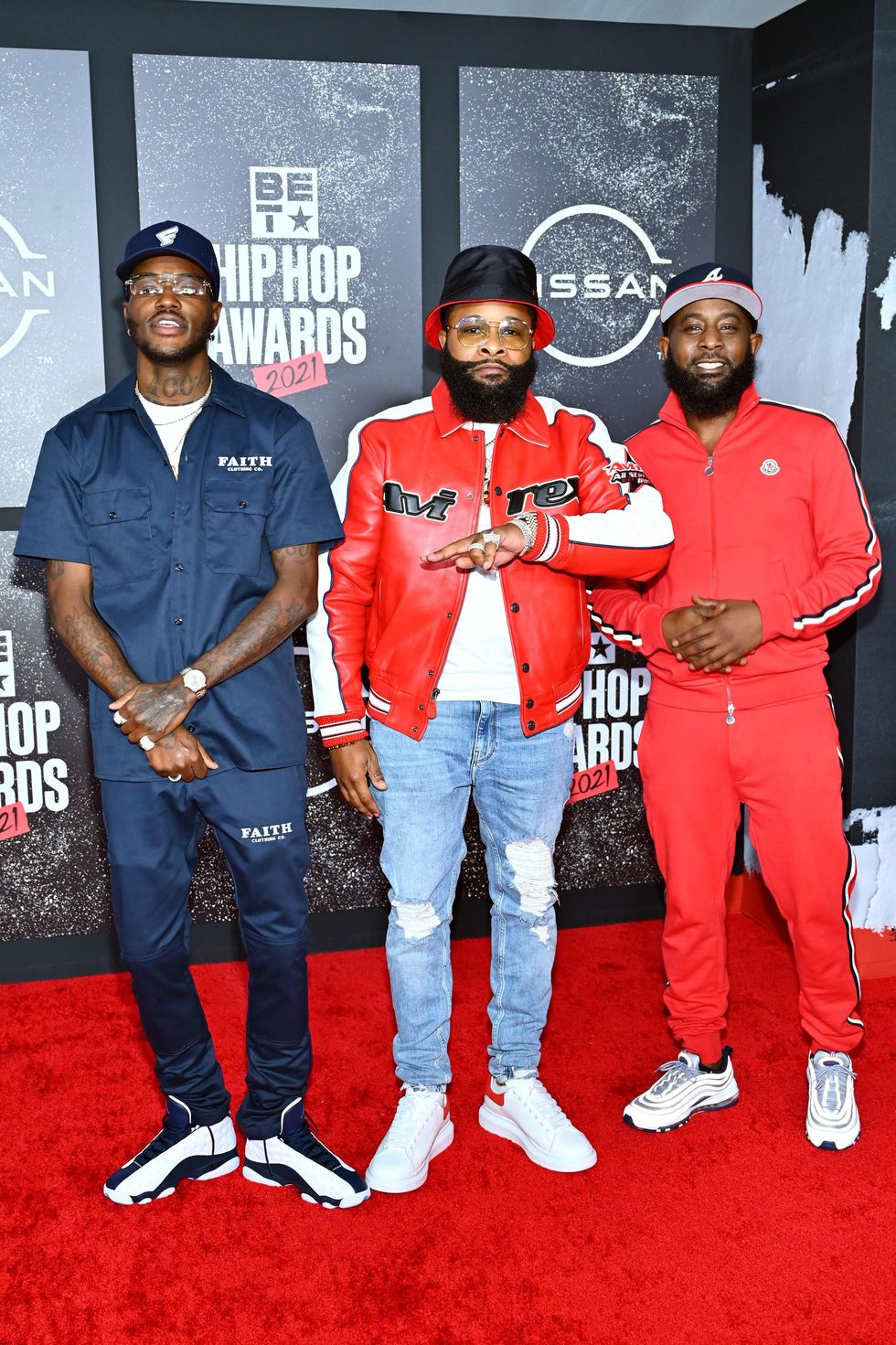
Derek White/WireImage via Getty Images
85 South put a show on the red carpet before taking up hosting duties inside. The crew donned a mix of utilitarian, classic hip hop, and new school fresh; each playing to their respective personalities.
Fat Joe
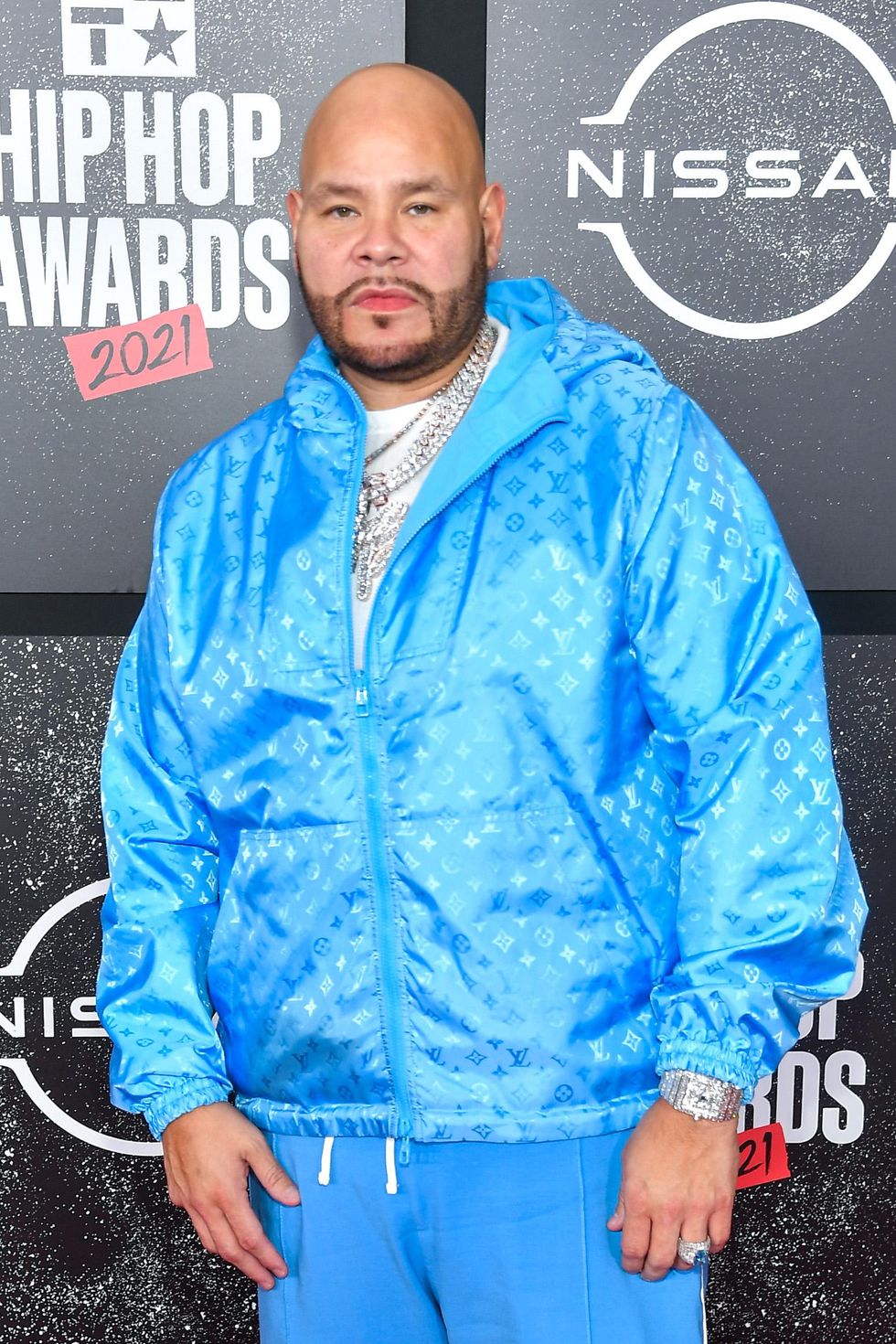
Paras Griffin/Getty Images for BET
Fat Joe went for the ultimate old-school hip-hop vibes this year. He hosted the BET Live pregame in baby blue sweatpants and a matching Louis Vuitton bomber jacket.
BIA
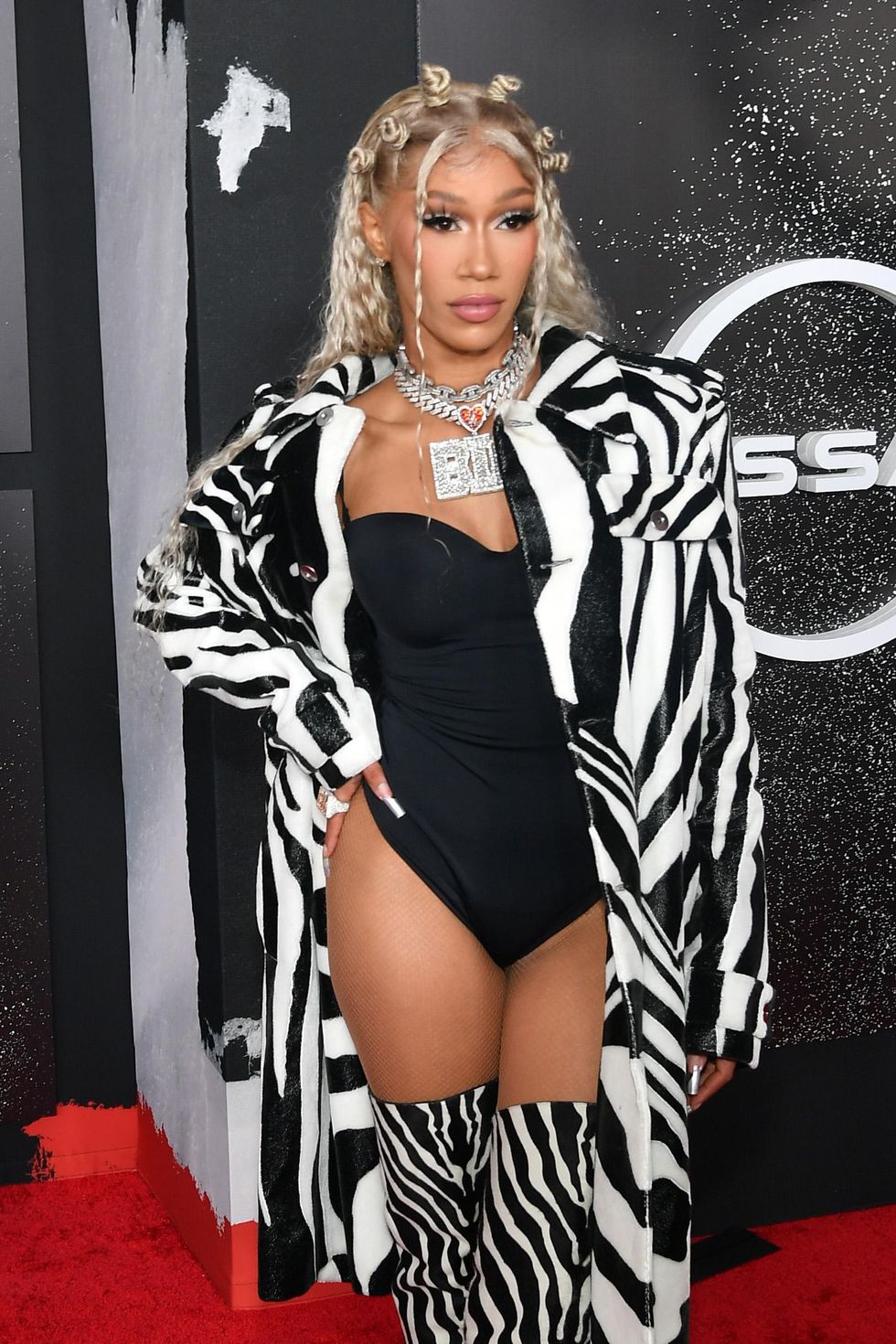
Paras Griffin/Getty Images for BET
Ahead of her performance, BIA shut it down in a black bodysuit and head-to-toe zebra print. The rapper solidified the look with an oversized 'BIA' chain and 90's-style crimped blonde hair.
Lakeyah
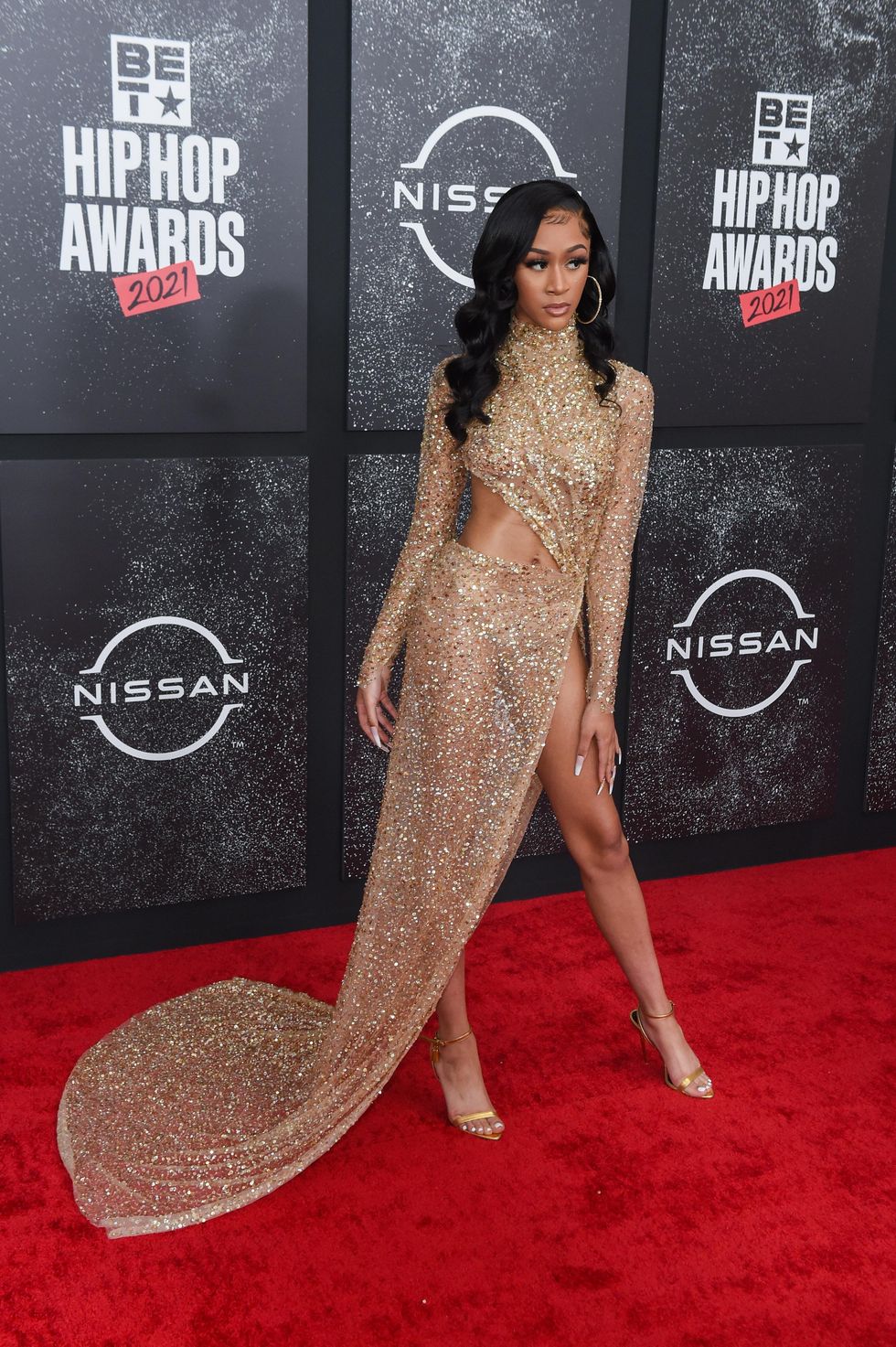
Aaron J. Thornton/Getty Images
The stunning rapper Lakeyah showed out in a beautifully draped gold-sequined cut-out gown. The gown was selectively sheer, giving us the ultimate sophisticated but seductive look.
Sarunas J. Jackson
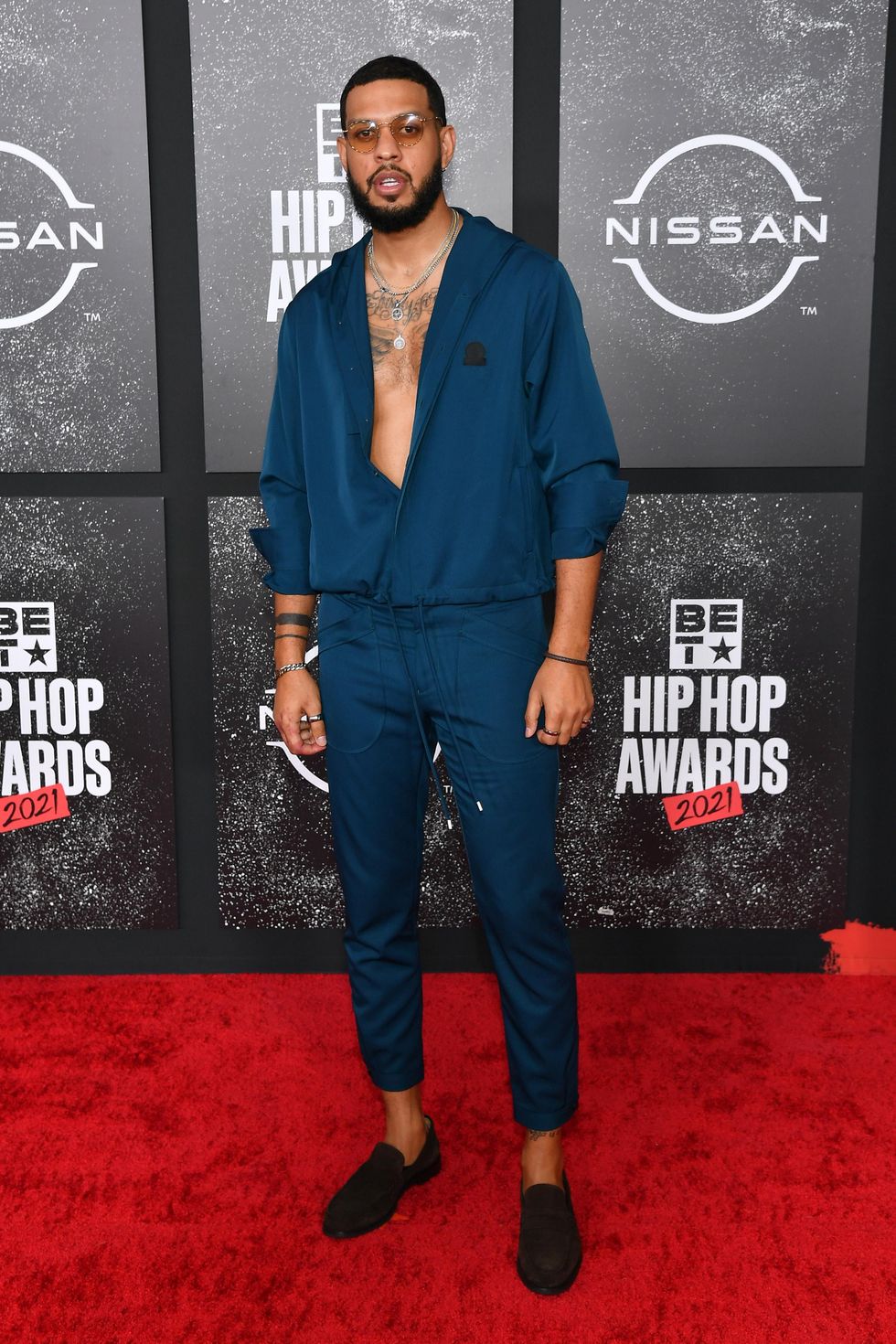
Paras Griffin/Getty Images for BET
The block's favorite Insecure love interests, Sarunas J. Jackson was peak causal in a delicious royal blue sweatsuit. While he did elevate the look by adding loafers, he doubled down on the coziness with the undone jacket. Speaking of Insecure, we can't wait to see the finale season on October 24.
Benny The Butcher
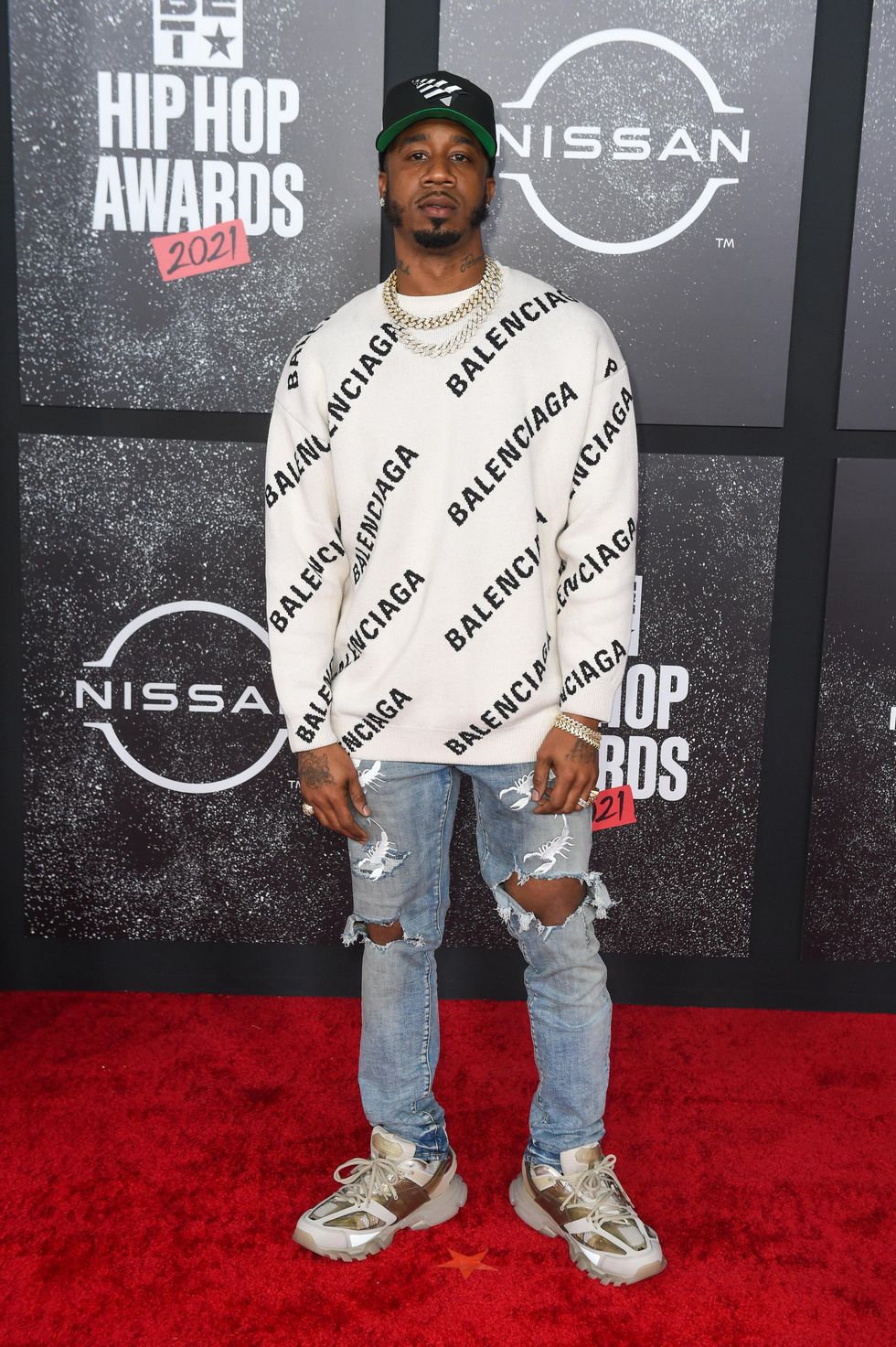
Aaron J. Thornton/Getty Images
Benny the Butcher stayed casual in a logo-centric Balenciaga sweater and gold accessories.
Kidd Kenn
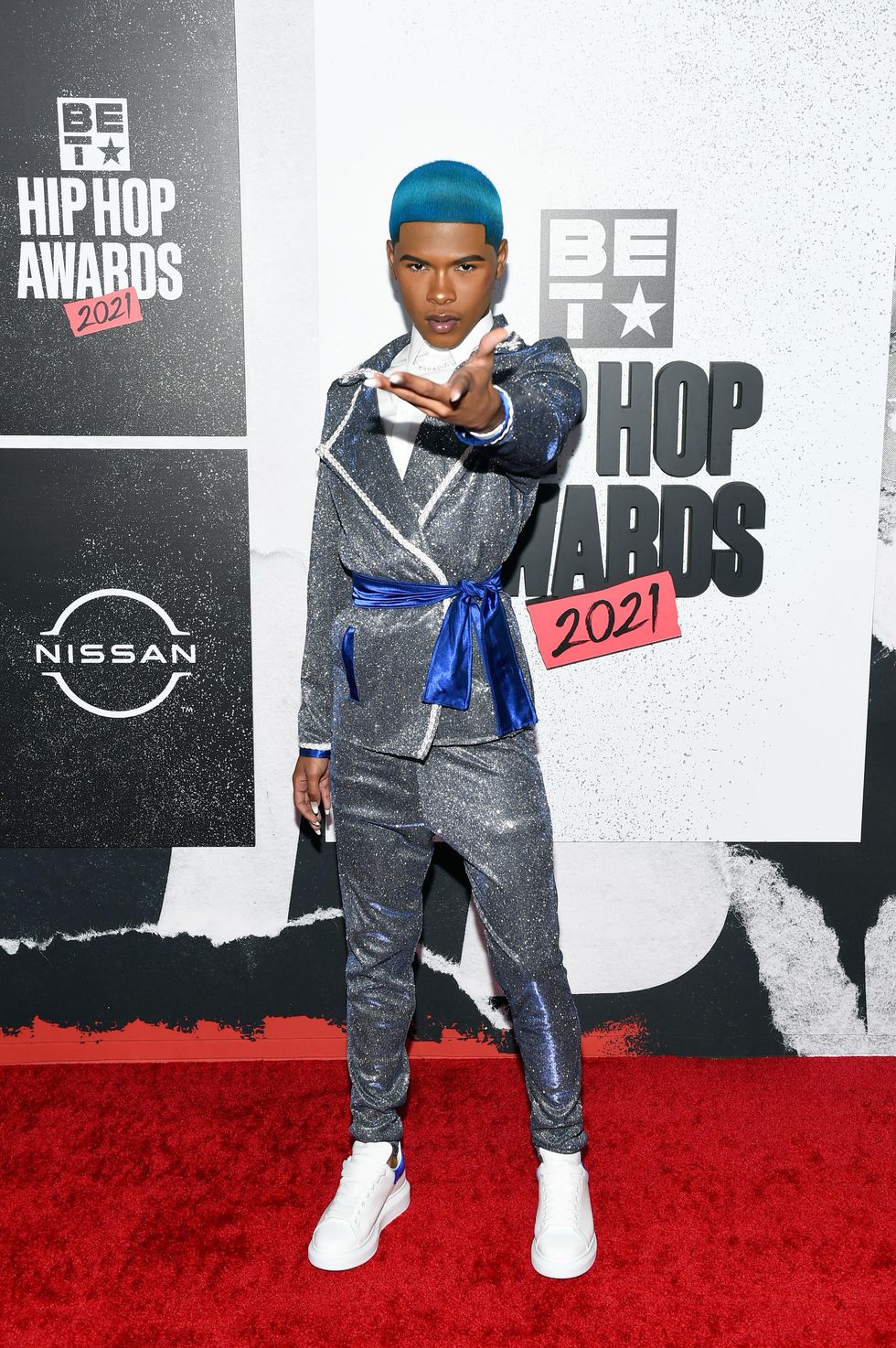
Marcus Ingram/Getty Images
Kidd Kenn shut down the red carpet in a modernized silver and blue suit. Male artists tend to wear the same thing, so it's exciting to see a risk-taker on the BET red carpet.
D Smoke & Angelina Sherie
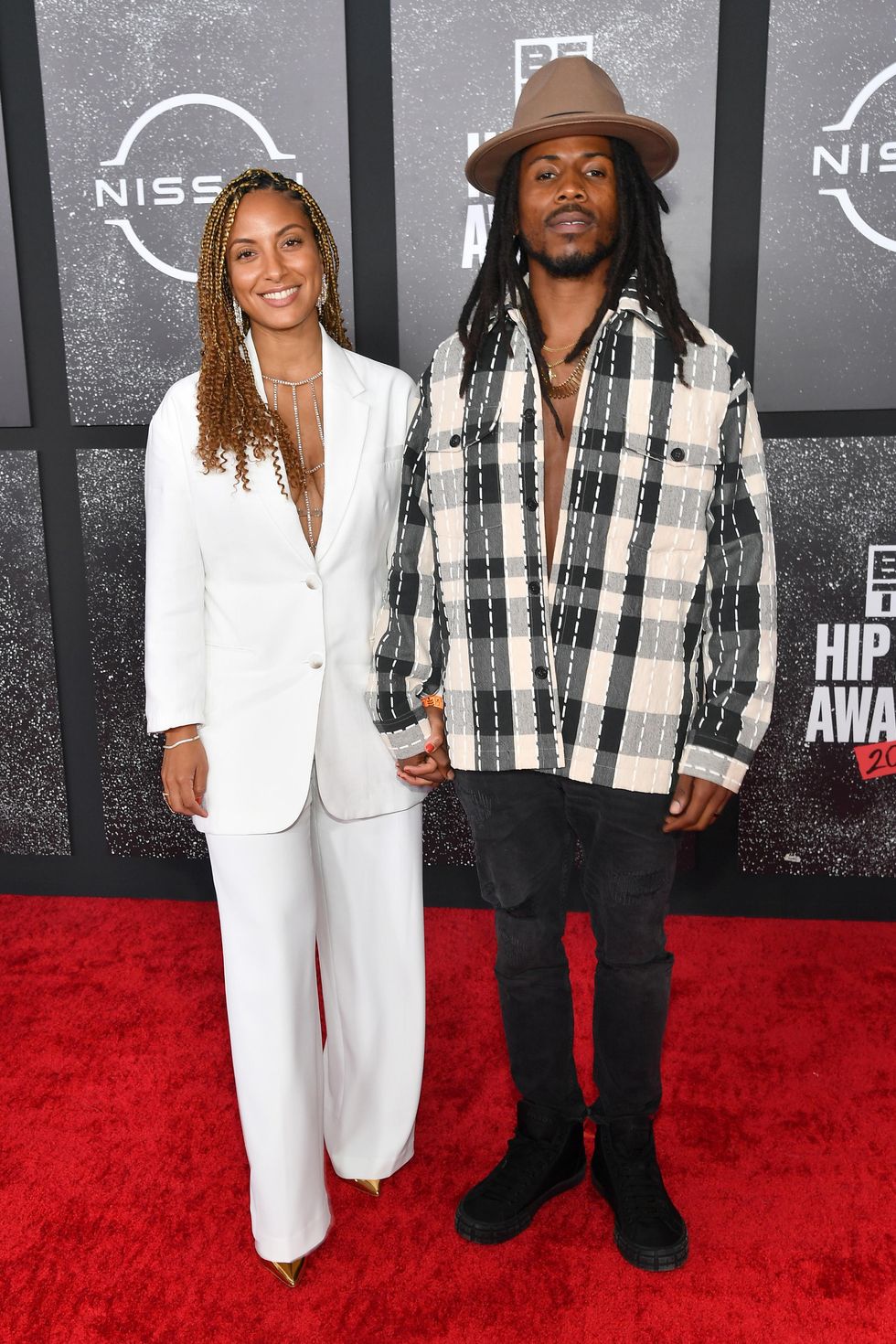
Paras Griffin/Getty Images for BET
D Smoke and Angelina Sherie were the epitome of cozy-chic as they hit the red carpet, hand-in-hand. Angelina was angelic in an all-white slightly oversized suit, while D Smoke elevated his casual look with a stylish wide-brim hat.
Nelly
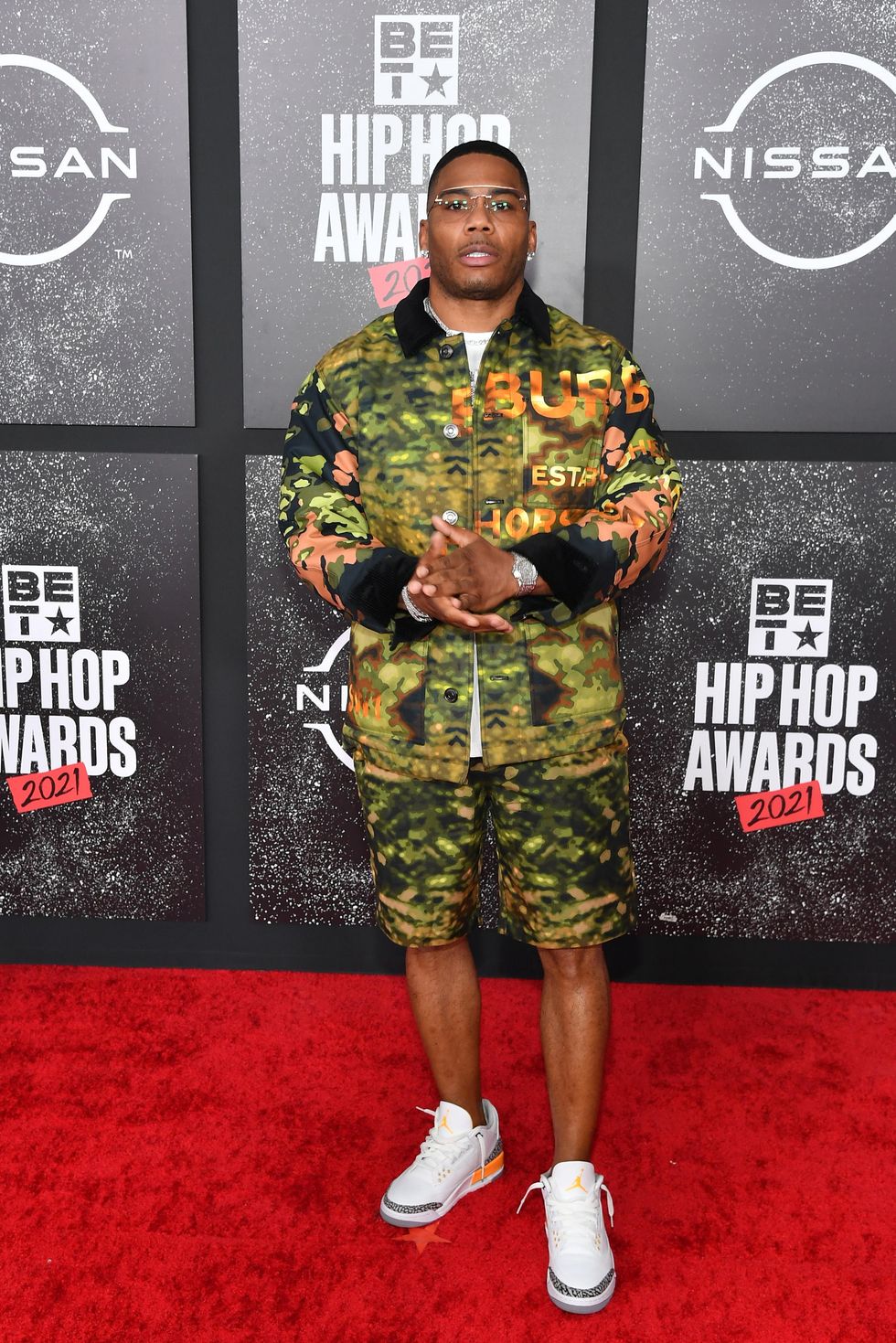
Paras Griffin/Getty Images for BET
Nelly was one of the only celebrities that brought the fall vibes on the carpet. The I Am Hip Hop Award honoree rocked camouflage Burberry from head to toe and accessorized in everyone's favorite: diamonds.
Ari Fletcher
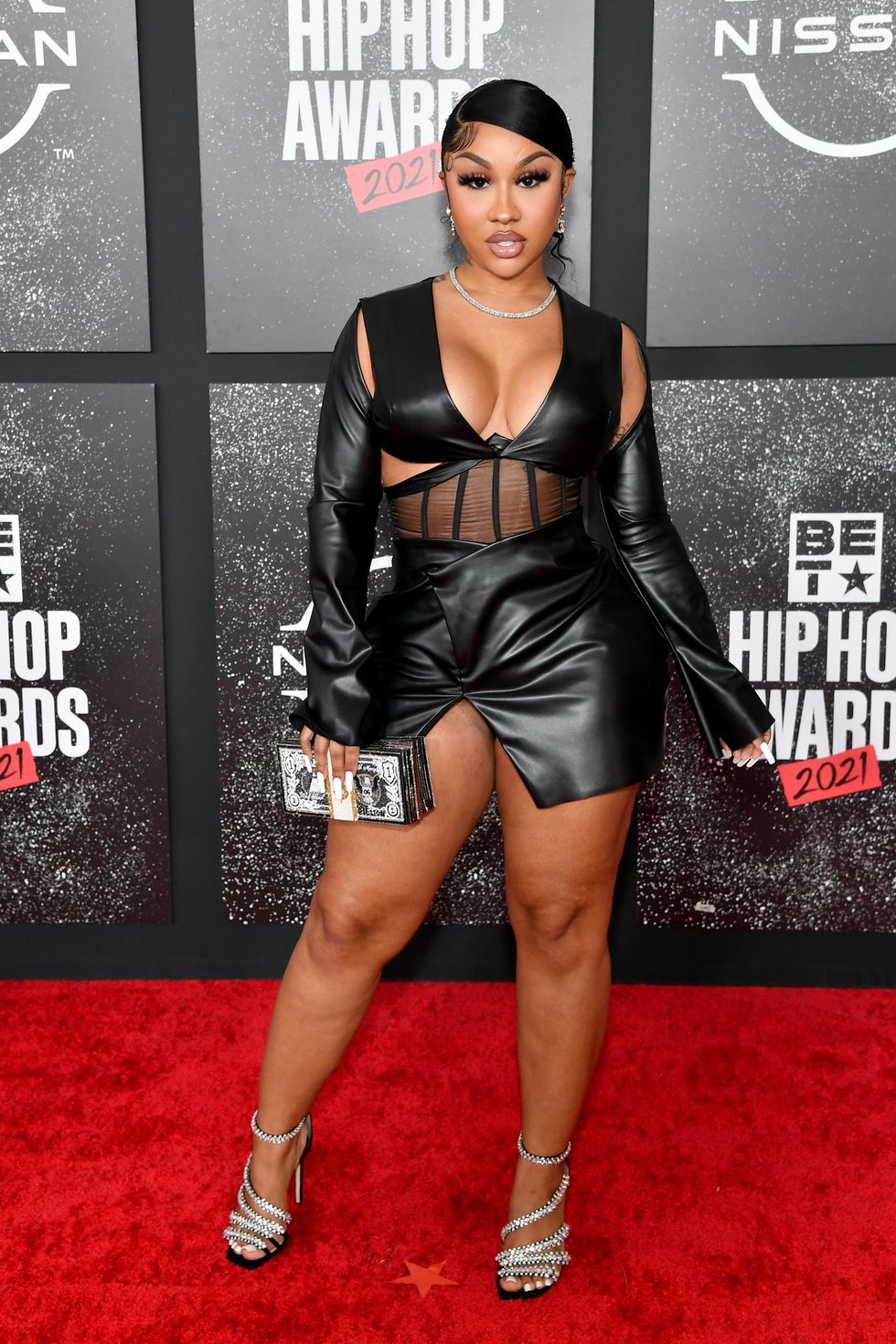
Paras Griffin/Getty Images for BET
Ari Fletcher came through to support her man, Moneybagg Yo, but she did not disappoint. In all-black custom Calechie, Ari completed the look with a sleek bun and meticulously placed diamond-studded barrettes.
Doechii
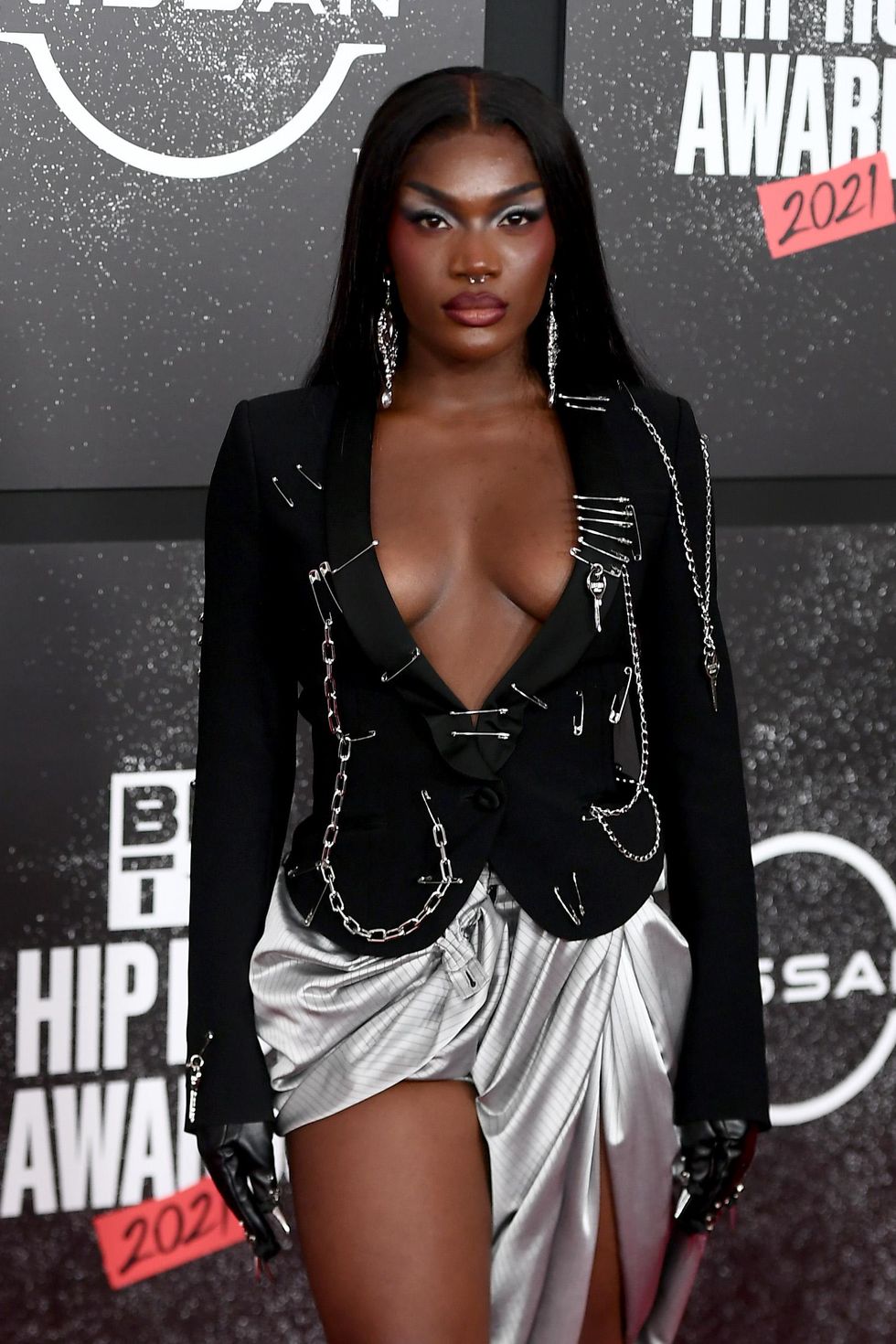
Marcus Ingram/Getty Images
Doechii stunned in a plunging neckline, secured by safety pins and the gods. The plunging neckline and metallic skirt are giving us major inspiration for upcoming holiday parties.
DreamDoll
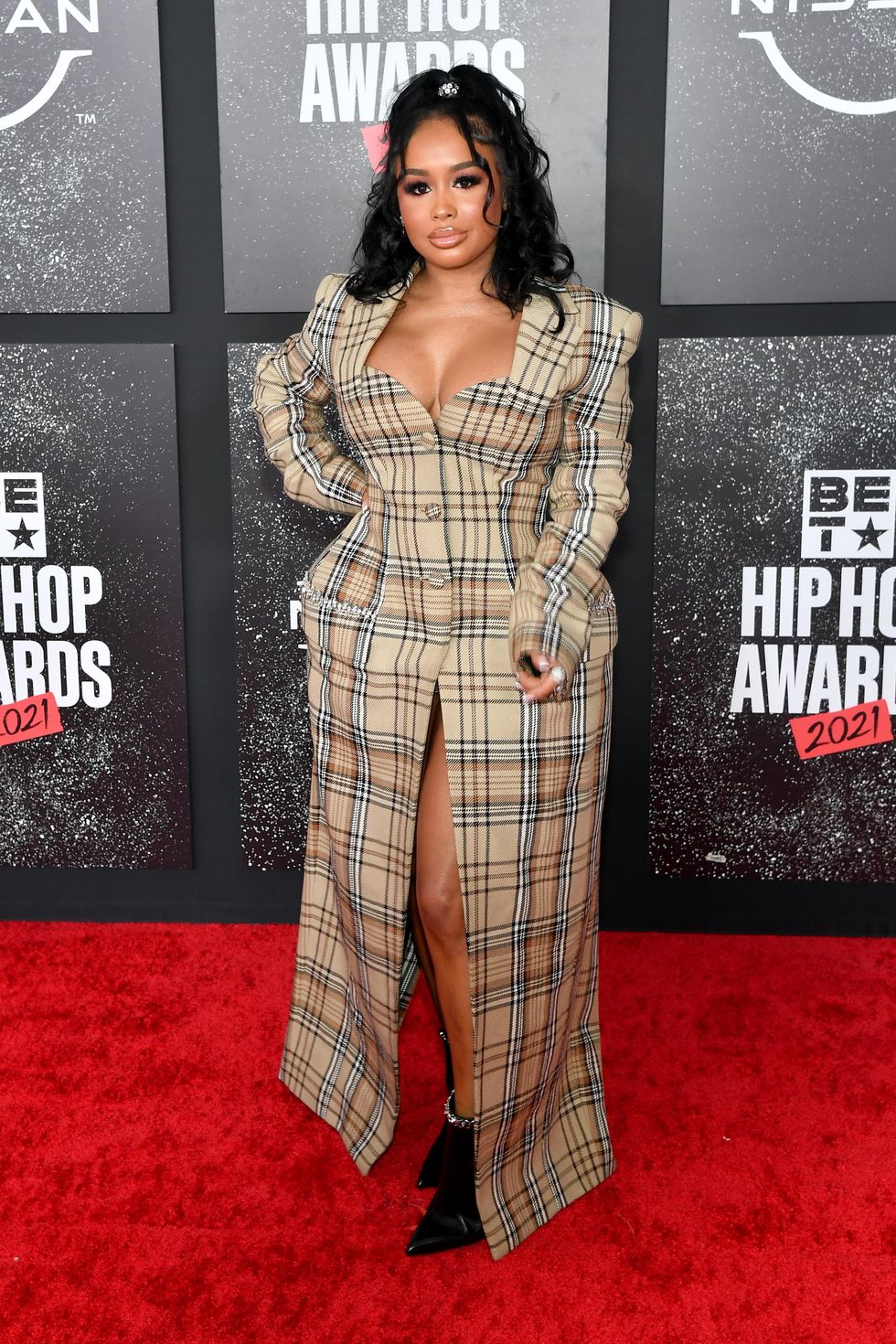
Paras Griffin/Getty Images for BET
DreamDoll decided to give us 'Headmistress Realness' in a corseted tuxedo coat-dress. Only a doll of this magnitude can pull off this plaid look effortlessly.
Nick Cannon
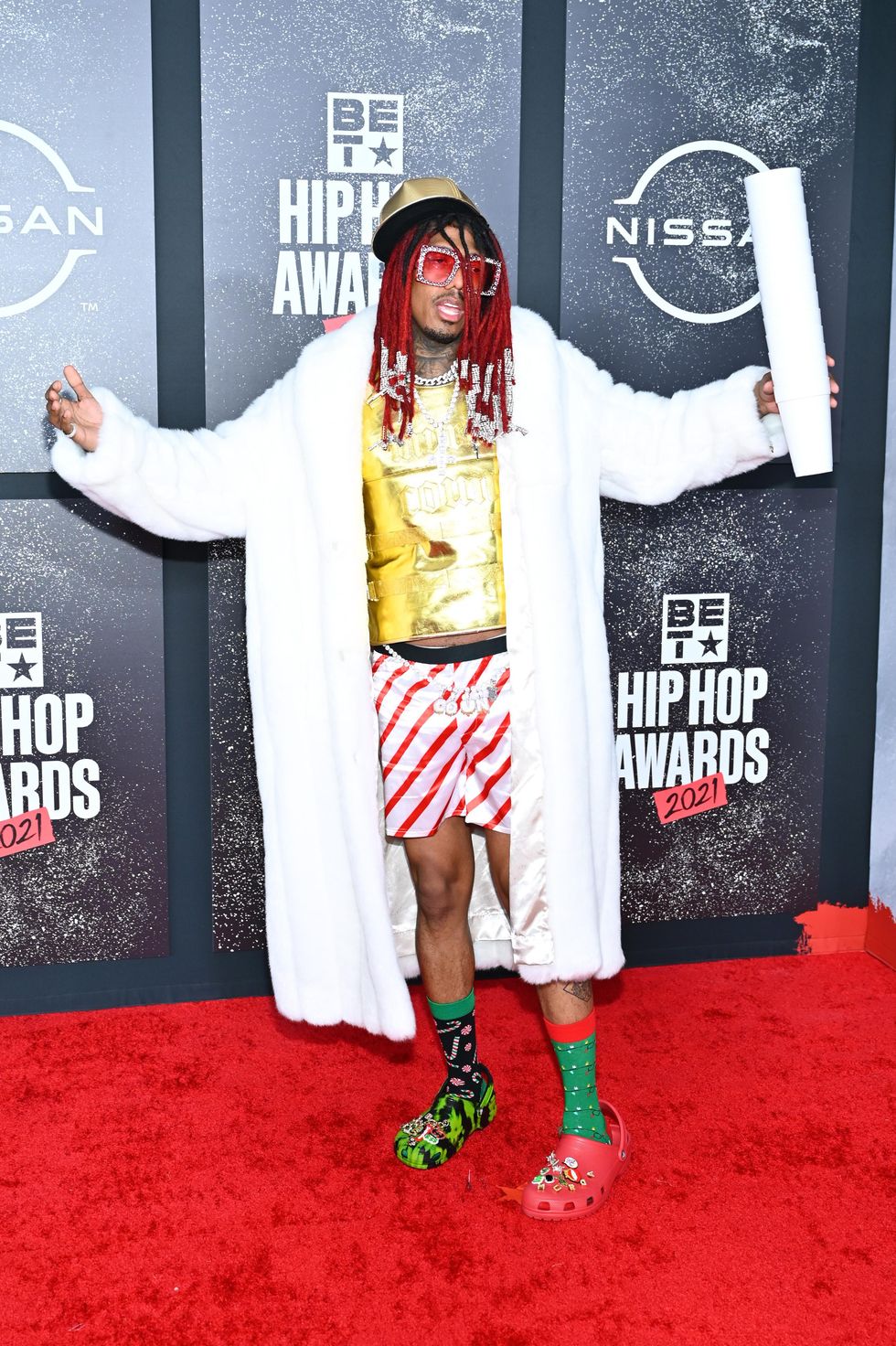
Derek White/WireImage via Getty Images
Nick Cannon showed up in Christmas crocs, a metal breastplate, and a long fur coat. Complete with red beaded braids and a stack of foam cups, it's clear that Nick opted for the classic Hollywood rockstar vibe.
Tyler, The Creator
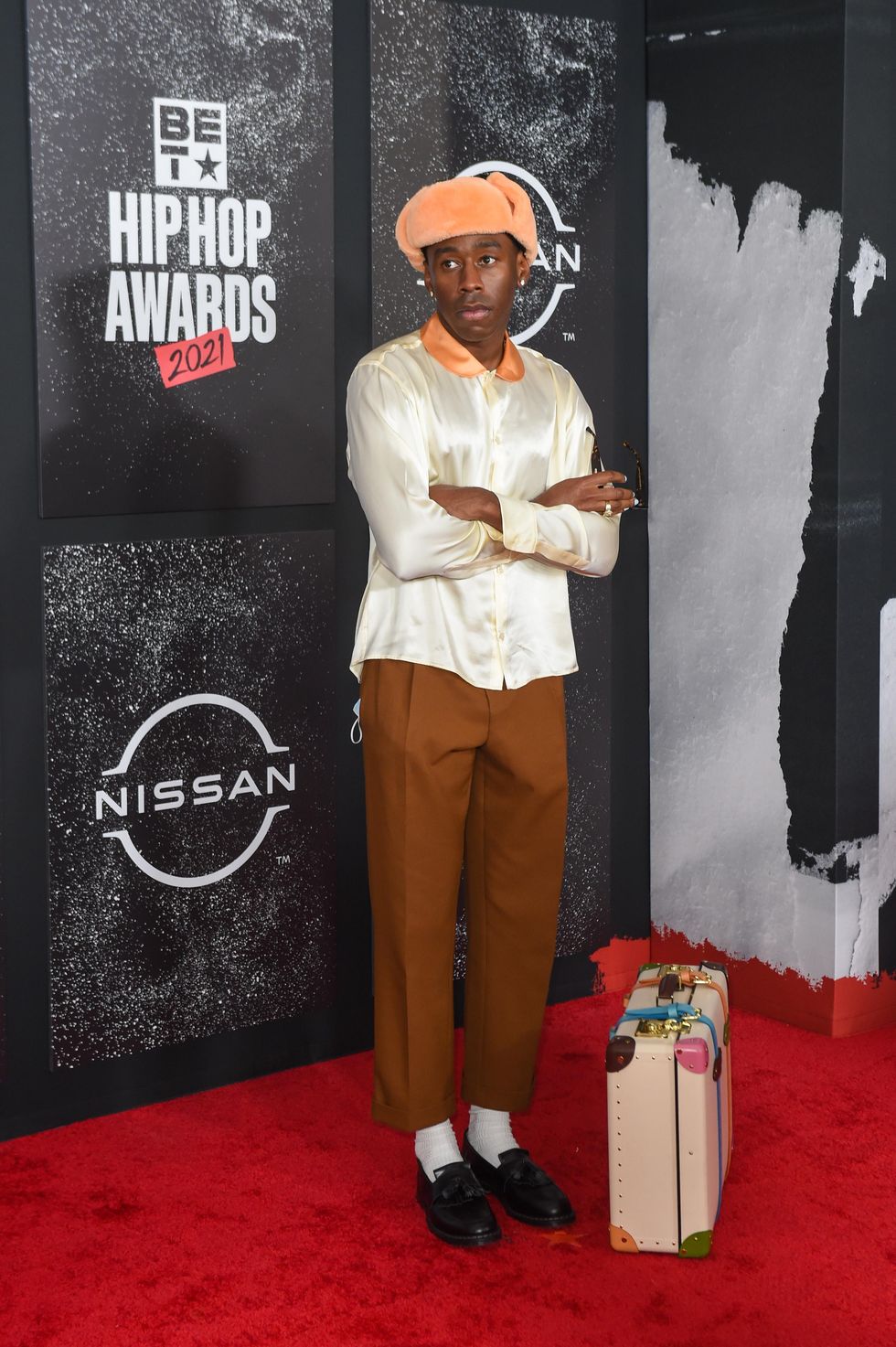
Aaron J. Thornton/Getty Images
Tyler, the Creator secured the bag literally. He channeled classic bellhop vibes in a plush orange hat, silky smooth button-up, and match suitcase that he often posed with on the carpet.
The Originals
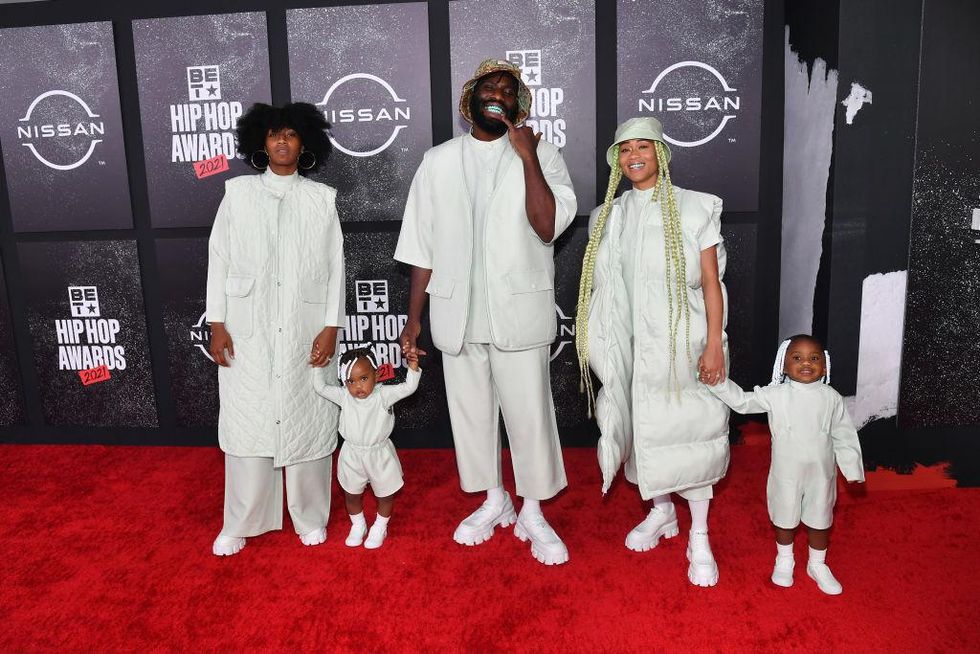
Paras Griffin/Getty Images for BET
LaNell Grant, her brother Tobe Nwigwe, and his wife Martika Ivory Rogers (also known as "Fat") were complete #familygoals on the red carpet as The Originals in coordinating sweatsuits. And we can talk about those adorable girls?! By far the cutest dressed in our book.
Remy Ma & Papoose
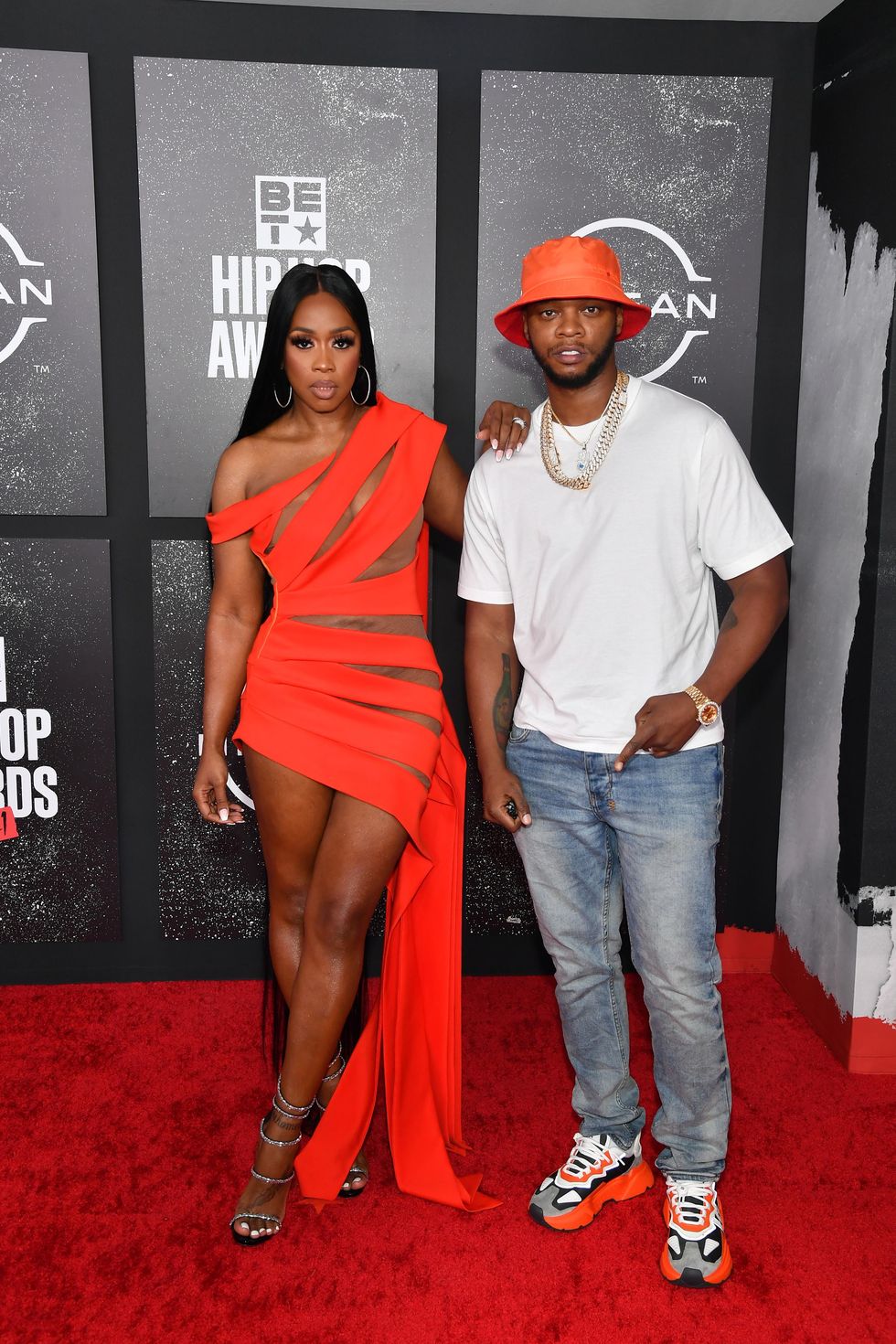
Paras Griffin/Getty Images for BET
Remy Ma left everyone speechless in a perfect cut-out red asymmetrical number, complete with gorgeous strappy heels. She pulled up with her husband Papoose, radiating Black love up and down the red carpet.
Latto
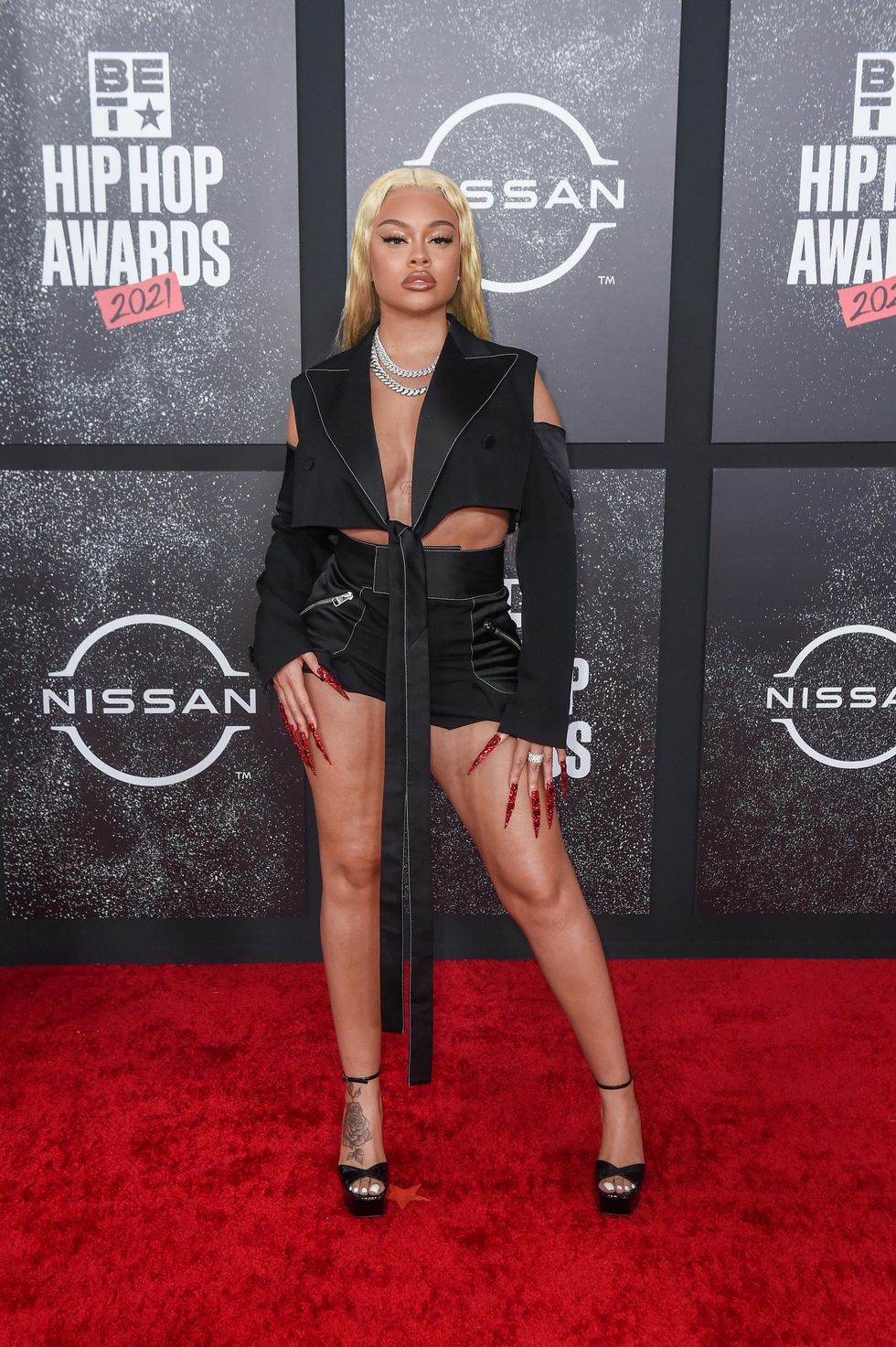
Aaron J. Thornton/Getty Images
Latto hit the red carpet in a modern deconstructed suit, with exposed, drop shoulders and 'cut-off' suit shorts. Latto personalized the look with her signature long (red) nails and layered silver chains.
Young Thug
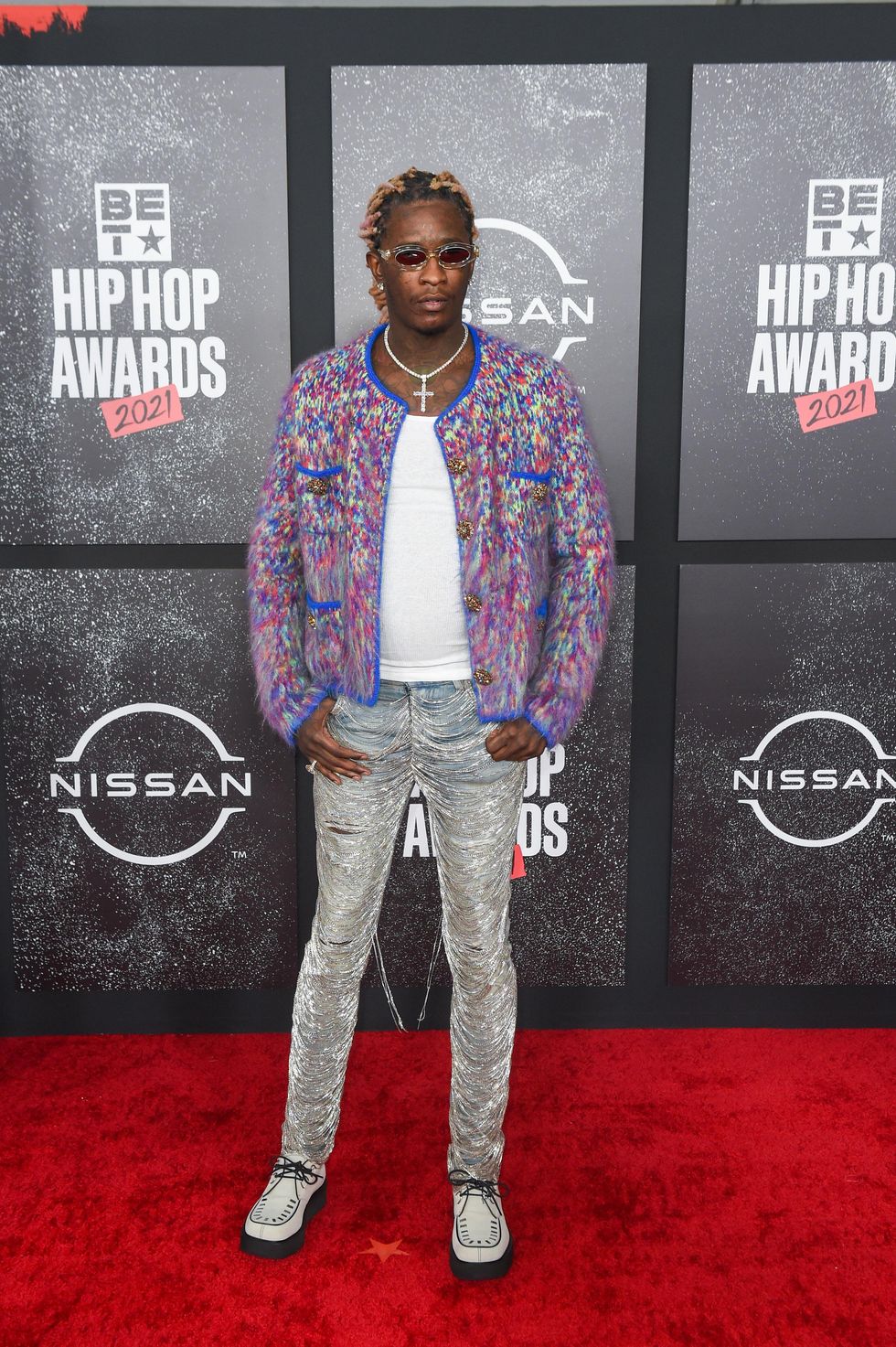
Aaron J. Thornton/Getty Images
By far one of the biggest risk-takers on the red carpet, Young Thug sported metallic-draped jeans and a fur-lined cardigan jacket. Complete with 90s style sunglasses, we always appreciate a man who takes risks in fashion.
Featured image by Paras Griffin/Getty Images for BET
This Is How To Keep 'Holiday Season Stress' From Infecting Your Relationship
Hmph. Maybe it’s just me, but it seems like there is something really weird happening in the fall season air (because winter doesn’t officially begin until December 21) that cuddle season is in full swing while break-up season is as well. In fact, did you know that break-ups are so popular during the holiday season that December 11 is deemed Break-Up Day?
The reasons why relationships shift around this time vary; however, I did both roll my eyes and chuckle when I read that a very popular one is because it’s an easy way to get out of getting one’s significant other a Christmas present. SMDH.
Anyway, I personally think that the less shallow folks out here may contemplate calling things “quits” or they at least distance themselves a bit from their partner (and what I’m referring to is serious relationships) due to all of the stress and strain that oftentimes comes with the holidays whether it be financial, familial, due to their tight schedules or something else.
Listen, I would hate for you and your man to miss the fun and happiness of experiencing this time of year, all because you are so overwhelmed or irritated that you can’t really enjoy it. That’s why I have a few practical tips for how to avoid allowing the typical holiday season stress from INFECTING your relationship.
Manage Your Expectations
 Giphy
GiphyUnmanaged expectations. If there is a main reason why the holiday season tends to be so stress-filled for so many people, I’d bet good money that this is the cause. And when you’re in a long-term relationship, expectations can manifest themselves in all sorts of cryptic and/or unexpected ways. You might have relatives who assume that you are going to be with them for Thanksgiving or Christmas when you have other plans in mind. You might be thinking that you are going to spend one amount for presents while your man is thinking something totally different. When it comes to scheduling, your signals may be crossed.
And you know what? To all of these scenarios, this is where clear and consistent communication come in. Don’t assume anything. Don’t dictate anything either. From now until New Year’s, mutually decide to check in once a week, just to make sure that you are both on the same page as it relates to the holidays and what you both are thinking will come along with it. The less blindsided you both feel, the less stressed out you will be. Trust me on this.
Set (and Keep) a Budget
 Giphy
GiphyOkay, so I read that last year, 36 percent of Americans incurred some type of holiday-related debt. Hmph. Last year, there was still some sense of normalcy in this country, chile, so I can only imagine what finances are gonna look like over the next several weeks. That said, since I don’t know a lot of people who don’t find being broke stressful, make sure that you and your bae set a budget and then stick to it this year — no ifs, ands or buts.
Because really, y’all — it doesn’t make sense to deplete savings and/or max out credit cards for a few days of giggles only to be damn near losing your mind because you don’t know how to make ends meet come Dr. Martin Luther King, Jr. Day.
And by the way, this tip doesn’t just speak to things like food and gifts; I also mean travel. If it doesn’t make a ton of sense (or cents) to be all over the place this year — DON’T BE.
Keep Matthew 5:37 at the Forefront
 Giphy
GiphyIf off the top of your head, you don’t know what Matthew 5:37 says, no worries, here ya go: “But let your ‘Yes’ be ‘Yes,’ and your ‘No,’ ‘No.’ For whatever is more than these is from the evil one.” That verse right there? Oh, it’s a boundaries lifesaver! I say that because do you see “maybe” or “I’ll think about it” in there? Nope. LOL. It says that you should tell people “yes” or “no” and leave it at that — and that complements Anne Lamott’s quote, “’No’ is a complete sentence” impeccably well. Yeah, you’ve got to remember that anything beyond a yes or no to a request is privileged information; you don’t owe anyone details or an explanation.
Besides, if you are really honest with yourself, when someone asks you something and you give a “Umm, let me think about it” kind of reply, more times than not, you already know what your answer is going to be — so why not let you both off of the hook? Give your response. Commit to that. And let everyone (including yourself) get on with their lives and schedules.
I promise you that when it comes to those holiday parties, you are pissing more folks off by not RSVP’ing or doing so and not showing up than just saying, “Thank you but not this year” off the rip.
Remember That Your Personal Space Is Privilege Not a Right
 Giphy
GiphyA friend of mine recently bought a new house and invited me over to come see it. He’s a single man with no children, so as I was taking in all of the space that he had, especially as I walked through his finished basement, I joked about relatives coming to live with him. “Hell no” and “absolutely not” were pretty much his immediate responses as he went on to say that some folks even had the nerve to be offended when he told them that he had no intentions on taking DNA in.
Ain’t it wild how people think that your stuff is their right? And yes, that brings me to my next point. Your home is your sanctuary space. If you want to host folks this year — cool. If not, ALSO COOL. Please don’t let folks (family included) guilt you into how they want you to act or even into what they would do if the shoe was on the other foot. You are not them — and as one of my favorite quotes states, “If two people were exactly alike, one of them would be unnecessary.” (A man by the name Larry Dixon said that.)
Hell, my friends? They know that I am good for sending them random things that they need or even want all throughout the year. Coming over to hang out at my pace, though. Uh-uh. Chalk it up to being a card-carrying member of the ambivert club yet I like keeping my living space personal — and I sleep like a baby, each and every night, for feeling that way.
Always remember that your space, your time, your resources, your energy and shoot, yourself period (including your relationship), are all things that are your own. You get to choose how, when and why you want to share them. The holiday season is certainly no exception.
Cultivate Some “You Two Only” Traditions
 Giphy
GiphyIt’s not uncommon for some couples to hit me up after the holiday season to “detox.” Sometimes it’s due to the financial drama (and sometimes trauma) that they experienced. Sometimes it’s because they allowed their relatives (especially in-laws) to get more into their personal business than they should’ve. More than anything, though, it tends to be because they didn’t get enough quality time together and so ended up feeling “disconnected.”
Please don’t let that happen. Listen, I’m not even a holidays kind of woman and yet, I will absolutely sit myself down with some hot chocolate and chocolate chip cookies to enjoy a Hallmark holiday film or two. Aside from the fact that most of them are lighthearted and sweet, I also like that they usually focus on couples loving on each other amidst all of the holiday beauty and ambiance — which is something that all couples should set aside some time to do.
Maybe it’s a vacation. Maybe it’s a staycation. Or maybe it’s my personal favorite, A SEXCATION. Whether it’s for a few days, the weekend or even overnight — don’t you let the holidays go by without setting aside time for you and your man to celebrate one another. Don’t you dare (check out “Are You Ready To Have Some Very Merry 'Christmas Sex'?”).
GET. SOME. REST.
 Giphy
GiphyI once read that 8 out of 10 people get stressed out over the holidays and 3 out of 10 lose sleep during to it — and when you’re stress-filled and sleep-deprived, that can absolutely lead to hypersensitivity, making mountains out of molehills and even not being in the mood for sex.
Your relationship can’t afford to go through any of this, so definitely make sure to prioritize rest. I don’t care how unrealistic it might seem during this time, sleep should never be seen as a luxury; it will always and forever be a great necessity.
That said, try to get no less than six hours of shut-eye in (check out “6 Fascinating Ways Sex And Sleep Definitely Go Hand In Hand”) and even ask your bae to take a nap with you sometimes (check out “Wanna Have Some Next-Level Sex? Take A Nap, Sis.”). Not only will sleep help to restore your mind, body and spirit but, when it’s with your partner, it’s an act of intimacy that can make you both feel super connected, even in the midst of what might feel like chaos.
___
Holiday season stress is real. Still, never give it the permission or power to throw your relationship off. Put you and your man first and let the holidays be what they are gonna be, chile.
Let’s make things inbox official! Sign up for the xoNecole newsletter for love, wellness, career, and exclusive content delivered straight to your inbox.
Featured image by Shutterstock
Dreaming Of A White Christmas? These 7 Winter Wonderland Destinations Are Perfect For The Holidays
While most people opt for a tropical vacation during the winter months, there are still many people who want to fulfill their winter wonderland fantasies, which are more than likely centered on watching snow by the fireplace while sipping some hot cocoa.
With Thanksgiving vastly approaching and Christmas a little under a month away, there is still time to ditch the traditional Christmas home to visit family or friends.
Whether you’re looking to put a new stamp on your passport and keep things domestic with a destination in the States, xoNecole has you covered with a few hotspots for those itching to go somewhere cold (but with cozy vibes) this holiday season.
Aspen, Colorado
Our Christmas queen, Mariah Carey, has been taking an annual trip to this snowy destination since 1997, just three years after dropping the track that would make her the unofficial (but official to us) ambassador of the winter holiday.
Aside from being a key vacation spot for one of the culture’s greatest musicians, Aspen also offers travelers access to world-class skiing and snowboarding and four distinct mountains that provide the perfect backdrop for a winter vacation.
Whistler, British Columbia, Canada
Home to the largest ski resort in North America, Whistler Blackcomb, this destination is located in the Coast Mountain Range and is about 75 miles north of Vancouver.
From luxury spas like Scandinave Spa Whistler to Olympic Park, this is another top winter vacation spot that offers a unique experience for people who love snow and the thrill of a good adventure.
Western Massachusetts
Dubbed the place for a magical holiday escape, Springfield, Massachusetts, blends the warmth of small-town charm with unforgettable experiences like Grinchmas at Springfield Museums, Winterlights at Naumkeag in Stockbridge, Historic Deerfield’s Winter Frolic, and many others.
This destination offers something for all ages, and it’s close to home, making it all the more reason to place on your radar for a winter getaway.
Rovaniemi, Finland
If you want to really get into the Christmas spirit, this just may be the place for you. As the official home to Saint Nick himself, Rovaniemi, Finland offers reindeer sleigh rides, the opportunity to stay in a glass igloo, as well as an opportunity to experience the Santa Claus Village.
Lake Tahoe, California/Nevada
Who says that visits to the lake house are only reserved for summer vacation? A winter trip to Lake Tahoe is equipped with stunning lake views and top-notch ski resorts, including Heavenly and Northstar.
Chamonix, France
Sitting at the base of Mont Blanc, Chamonix, France, is known for its skiing and mountaineering. This destination is home to the Aiguille du Midi cable car, the charming Alpine village, and is also close to various other European ski destinations.
Northeastern Pennsylvania
This area of the U.S. state is home to the Poconos Mountains, whose renowned ski resorts include Camelback Mountain, Blue Mountain, and Jack Frost Big Boulder. Whether you’re a ski expert, a beginner, or just there for the vibes, this destination makes for a winter vacation that balances fun adventures and cozy getaways. Additionally, Pennsylvania is home to the Christmas Tree Capital of the world.
Feature image by Shutterstock
Originally published on November 23, 2024






